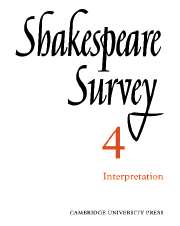Book contents
- Frontmatter
- Fifty Years of Shakespearian Criticism: 1900–1950
- Motivation in Shakespeare’s Choice of Materials
- The Sources of Macbeth
- Shakespeare and the ‘Ordinary’ Word
- Malone and the Upstart Crow
- An Early Copy of Shakespeare's Will
- The Shakespeare Collection in the Bodleian Library, Oxford
- Was there a ‘Tarras’ in Shakespeare’s Globe?
- Tradition, Style and the Theatre To-day
- Shakespeare in Slovakia
- Shakespeare in Post-War Yugoslavia
- International Notes
- Shakespeare’s Comedies and the Modern Stage
- The Year's Contributions to Shakespearian Study 1 Critical Studies
- 2 Shakespeare’s Life, Times and Stage
- 3 Textual Studies
- Book Received
- Index
- Plate Section
Shakespeare and the ‘Ordinary’ Word
Published online by Cambridge University Press: 28 March 2007
- Frontmatter
- Fifty Years of Shakespearian Criticism: 1900–1950
- Motivation in Shakespeare’s Choice of Materials
- The Sources of Macbeth
- Shakespeare and the ‘Ordinary’ Word
- Malone and the Upstart Crow
- An Early Copy of Shakespeare's Will
- The Shakespeare Collection in the Bodleian Library, Oxford
- Was there a ‘Tarras’ in Shakespeare’s Globe?
- Tradition, Style and the Theatre To-day
- Shakespeare in Slovakia
- Shakespeare in Post-War Yugoslavia
- International Notes
- Shakespeare’s Comedies and the Modern Stage
- The Year's Contributions to Shakespearian Study 1 Critical Studies
- 2 Shakespeare’s Life, Times and Stage
- 3 Textual Studies
- Book Received
- Index
- Plate Section
Summary
Analysing Shakespeare’s development as a poet, George Rylands has said: “He was first an Elizabethan poet and it is of this stuff [i.e. the sonnets of Petrarch, the Pléiade, Lyly, etc.] that Elizabethan poetry was made.” That is undeniably the case; but Rylands goes on to say:
In the two following passages there is hardly a distinguishing mark. Both are Elizabethan:
At last the golden Oriental gate
Of greatest heaven gan to open fair,
And Phoebus fresh as a bridegroom to his mate
Came dancing forth shaking his golden hair.
See how the morning opes her golden gates,
And takes her farewell of the glorious sun,
How well resembles it the prime of youth
Trimmed like a younker prancing to his love.
The first is Spenser, the second the young Shakespeare; and although Shakespeare is a little freer in movement and cannot resist transforming Phoebus Apollo into an Elizabethan gallant, the idiom is the same.
It is true that the rhetorical texture (of a neo-classic, decorative kind) of the two passages is the same. There are, however, and in spite of the striking verbal parallels, more distinguishing marks than Rylands perhaps had space to enumerate. In the first place, Spenser would appear to be more conscious that he is addressing a cultivated audience. His poetry, therefore, is deliberately reminiscent and sophisticated in a way which Shakespeare largely abandoned when he turned to the theatre.
- Type
- Chapter
- Information
- Shakespeare Survey , pp. 49 - 55Publisher: Cambridge University PressPrint publication year: 1951

